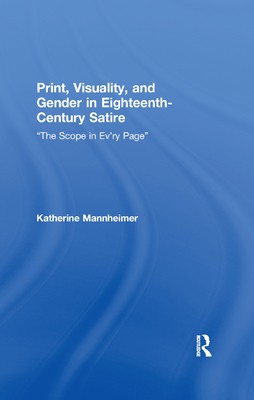
- Išsiųsime per 10–14 d.d.
- Autorius: Katherine Mannheimer
- Leidėjas: Routledge
- ISBN-10: 0367866188
- ISBN-13: 9780367866181
- Formatas: 15.2 x 22.9 x 1.5 cm, minkšti viršeliai
- Kalba: Anglų
- Extra -15 % nuolaida šiai knygai su kodu: ENG15
Print, Visuality, and Gender in Eighteenth-Century Satire (el. knyga) (skaityta knyga) | knygos.lt
Atsiliepimai
Aprašymas
This study interprets eighteenth-century satire's famous typographical obsession as a fraught response to the Enlightenment's "ocularcentric" epistemological paradigms, as well as to a print-cultural moment identified by book-historians as increasingly "visual" - a moment at which widespread attention was being paid, for the first time, to format, layout, and eye-catching advertising strategies. On the one hand, the Augustans were convinced of the ability of their elaborately printed texts to function as a kind of optical machinery rivaling that of the New Science, enhancing readers' physical but also moral vision. On the other hand, they feared that an overly scrutinizing gaze might undermine the viewer's natural faculty for candor and sympathy, delight and desire. In readings of Pope, Swift, and Montagu, Mannheimer shows how this distrust of the empirical gaze led to a reconsideration of the ethics, and most specifically the gender politics, of ocularcentrism. Whereas Montagu effected this reconsideration by directly satirizing both the era's faith in the visual and its attendant publishing strategies, Pope and Swift pursued their critique via print itself: thus whether via facing-page translations, fictional editors, or disingenuous footnotes, these writers sought to ensure that typography never became either a mere tool of (or target for) the objectifying gaze, but rather that it remained a dynamic and interactive medium by which readers could learn both to see and to see themselves seeing.
EXTRA 15 % nuolaida su kodu: ENG15
Akcija baigiasi už 5d.08:24:08
Nuolaidos kodas galioja perkant nuo 10 €. Nuolaidos nesumuojamos.

- Autorius: Katherine Mannheimer
- Leidėjas: Routledge
- ISBN-10: 0367866188
- ISBN-13: 9780367866181
- Formatas: 15.2 x 22.9 x 1.5 cm, minkšti viršeliai
- Kalba: Anglų
This study interprets eighteenth-century satire's famous typographical obsession as a fraught response to the Enlightenment's "ocularcentric" epistemological paradigms, as well as to a print-cultural moment identified by book-historians as increasingly "visual" - a moment at which widespread attention was being paid, for the first time, to format, layout, and eye-catching advertising strategies. On the one hand, the Augustans were convinced of the ability of their elaborately printed texts to function as a kind of optical machinery rivaling that of the New Science, enhancing readers' physical but also moral vision. On the other hand, they feared that an overly scrutinizing gaze might undermine the viewer's natural faculty for candor and sympathy, delight and desire. In readings of Pope, Swift, and Montagu, Mannheimer shows how this distrust of the empirical gaze led to a reconsideration of the ethics, and most specifically the gender politics, of ocularcentrism. Whereas Montagu effected this reconsideration by directly satirizing both the era's faith in the visual and its attendant publishing strategies, Pope and Swift pursued their critique via print itself: thus whether via facing-page translations, fictional editors, or disingenuous footnotes, these writers sought to ensure that typography never became either a mere tool of (or target for) the objectifying gaze, but rather that it remained a dynamic and interactive medium by which readers could learn both to see and to see themselves seeing.





Atsiliepimai